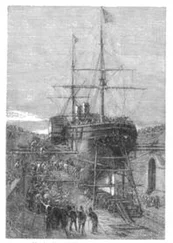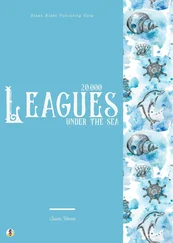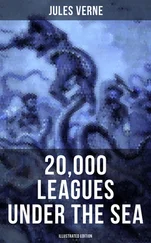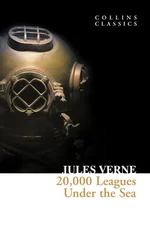Jules Verne - Twenty Thousand Leagues Under the Sea
Здесь есть возможность читать онлайн «Jules Verne - Twenty Thousand Leagues Under the Sea» — ознакомительный отрывок электронной книги совершенно бесплатно, а после прочтения отрывка купить полную версию. В некоторых случаях можно слушать аудио, скачать через торрент в формате fb2 и присутствует краткое содержание. Жанр: sf_writing, на английском языке. Описание произведения, (предисловие) а так же отзывы посетителей доступны на портале библиотеки ЛибКат.
- Название:Twenty Thousand Leagues Under the Sea
- Автор:
- Жанр:
- Год:неизвестен
- ISBN:нет данных
- Рейтинг книги:5 / 5. Голосов: 2
-
Избранное:Добавить в избранное
- Отзывы:
-
Ваша оценка:
- 100
- 1
- 2
- 3
- 4
- 5
Twenty Thousand Leagues Under the Sea: краткое содержание, описание и аннотация
Предлагаем к чтению аннотацию, описание, краткое содержание или предисловие (зависит от того, что написал сам автор книги «Twenty Thousand Leagues Under the Sea»). Если вы не нашли необходимую информацию о книге — напишите в комментариях, мы постараемся отыскать её.
Twenty Thousand Leagues Under the Sea — читать онлайн ознакомительный отрывок
Ниже представлен текст книги, разбитый по страницам. Система сохранения места последней прочитанной страницы, позволяет с удобством читать онлайн бесплатно книгу «Twenty Thousand Leagues Under the Sea», без необходимости каждый раз заново искать на чём Вы остановились. Поставьте закладку, и сможете в любой момент перейти на страницу, на которой закончили чтение.
Интервал:
Закладка:
Mouth and teeth! No one could better describe the macrocephalous cachalot, which is sometimes more than seventy-five feet long. Its enormous head occupies one-third of its entire body. Better armed than the whale, whose upper jaw is furnished only with whalebone, it is supplied with twenty-five large tusks, about eight inches long, cylindrical and conical at the top, each weighing two pounds. It is in the upper part of this enormous head, in great cavities divided by cartilages, that is to be found from six to eight hundred pounds of that precious oil called spermaceti. The cachalot is a disagreeable creature, more tadpole than fish, according to Fredol's description. It is badly formed, the whole of its left side being (if we may say it) a "failure," and being only able to see with its right eye. But the formidable troop was nearing us. They had seen the whales and were preparing to attack them. One could judge beforehand that the cachalots would be victorious, not only because they were better built for attack than their inoffensive adversaries, but also because they could remain longer underwater without coming to the surface. There was only just time to go to the help of the whales. The Nautilus went underwater. Conseil, Ned Land, and I took our places before the window in the saloon, and Captain Nemo joined the pilot in his cage to work his apparatus as an engine of destruction. Soon I felt the beatings of the screw quicken, and our speed increased. The battle between the cachalots and the whales had already begun when the Nautilus arrived. They did not at first show any fear at the sight of this new monster joining in the conflict. But they soon had to guard against its blows. What a battle! The Nautilus was nothing but a formidable harpoon, brandished by the hand of its captain. It hurled itself against the fleshy mass, passing through from one part to the other, leaving behind it two quivering halves of the animal. It could not feel the formidable blows from their tails upon its sides, nor the shock which it produced itself, much more. One cachalot killed, it ran at the next, tacked on the spot that it might not miss its prey, going forward and backward, answering to its helm, plunging when the cetacean dived into the deep waters, coming up with it when it returned to the surface, striking it front or sideways, cutting or tearing in all directions, and at any pace, piercing it with its terrible spur. What carnage! What a noise on the surface of the waves! What sharp hissing, and what snorting peculiar to these enraged animals! In the midst of these waters generally so peaceful their tails made perfect billows. For one hour this wholesale massacre continued, from which the cachalots could not escape. Several times ten or twelve united tried to crush the Nautilus by their weight. From the window we could see their enormous mouths studded with tusks, and their formidable eyes. Ned Land could not contain himself, he threatened and swore at them. We could feel them clinging to our vessel like dogs worrying a wild boar in a copse. But the Nautilus, working its screw, carried them here and there, or to the upper levels of the ocean, without caring for their enormous weight, nor the powerful strain on the vessel. At length, the mass of cachalots broke up, the waves became quiet, and I felt that we were rising to the surface. The panel opened, and we hurried on to the platform. The sea was covered with mutilated bodies. A formidable explosion could not have divided and torn this fleshy mass with more violence. We were floating amid gigantic bodies, bluish on the back and white underneath, covered with enormous protuberances. Some terrified cachalots were flying toward the horizon. The waves were dyed red for several miles, and the Nautilus floated in a sea of blood. Captain Nemo joined us.
"Well, Master Land?" said he.
"Well, sir," replied the Canadian, whose enthusiasm had somewhat calmed; "it is a terrible spectacle, certainly. But I am not a butcher. I am a hunter, and I call this a butchery."
"It is a massacre of mischievous creatures," replied the captain; "and the Nautilus is not a butcher's knife."
"I like my harpoon better," said the Canadian.
"Everyone to his own," answered the captain, looking fixedly at Ned Land.
I feared he would commit some act of violence, which would end in sad consequences. But his anger was turned by the sight of a whale which the Nautilus had just come up with. The creature had not quite escaped from the cachalot's teeth. I recognized the southern whale by its flat head, which is entirely black. Anatomically, it is distinguished from the white whale and the North Cape whale by the seven cervical vertebr?, and it has two more ribs than its congeners. The unfortunate cetacean was lying on its side, riddled with holes from the bites, and quite dead. From its mutilated fin still hung a young whale which it could not save from the massacre. Its open mouth let the water flow in and out, murmuring like the waves breaking on the shore. Captain Nemo steered close to the corpse of the creature. Two of his men mounted its side, and I saw, not without surprise, that they were drawing from its breasts all the milk which they contained, that is to say, about two or three tons. The captain offered me a cup of the milk, which was still warm. I could not help showing my repugnance to the drink; but he assured me that it was excellent, and not to be distinguished from cow's milk. I tasted it, and was of his opinion. It was a useful reserve to us, for in the shape of salt butter or cheese it would form an agreeable variety from our ordinary food. From that day I noticed with uneasiness that Ned Land's ill-will toward Captain Nemo increased, and I resolved to watch the Canadian's gestures closely.
| Go to Contents |
The Nautilus was steadily pursuing its southerly course, following the fiftieth meridian with considerable speed. Did he wish to reach the pole? I did not think so, for every attempt to reach that point had hitherto failed. Again the season was far advanced; for in the antarctic regions the 13th of March corresponds with the 13th of September of northern regions, which begins at the equinoctial season. On the 14th of March I saw floating ice in latitude 55 , merely pale bits of debris from twenty to twenty-five feet long, forming banks over which the sea curled. The Nautilus remained on the surface of the ocean. Ned Land, who had fished in the arctic seas, was familiar with its icebergs; but Conseil and I admired them for the first time. In the atmosphere toward the southern horizon stretched a white dazzling band. English whalers had given it the name of "ice blink." However thick the clouds may be, it is always visible, and announces the presence of an ice-pack or bank. Accordingly, larger blocks soon appeared, whose brilliancy changed with the caprices of the fog. Some of these masses showed green veins, as if long undulating lines had been traced with sulphate of copper; others resembled enormous amethysts with the light shining through them. Some reflected the light of day upon a thousand crystal facets. Others shaded with vivid calcareous reflections resembled a perfect town of marble. The more we neared the south the more these floating islands increased both in number and importance.
At the sixtieth degree of latitude, every pass had disappeared. But seeking carefully, Captain Nemo soon found a narrow opening, through which he boldly slipped, knowing, however, that it would close behind him. Thus, guided by this clever hand, the Nautilus passed through all the ice with a precision which quite charmed Conseil; icebergs or mountains, ice-fields or smooth plains, seeming to have no limits, drift ice or floating ice-packs, or plains broken up, called palches when they are circular, and streams when they are made up of long strips. The temperature was very low; the thermometer exposed to the air marked two or three degrees below zero, but we were warmly clad with fur, at the expense of the sea bear and seal. The interior of the Nautilus, warmed regularly by its electric apparatus, defied the most intense cold. Besides, it would only have been necessary to go some yards beneath the waves to find a more bearable temperature. Two months earlier we should have had perpetual daylight in these latitudes; but already we had three or four hours night, and by and by there would be six months of darkness in these circumpolar regions. On the 15th of March we were in the latitude of New Shetland and South Orkney. The captain told me that formerly numerous tribes of seals inhabited them; but that English and American whalers, in their rage for destruction, massacred both old and young; thus where there was once life and animation, they had left silence and death.
Читать дальшеИнтервал:
Закладка:
Похожие книги на «Twenty Thousand Leagues Under the Sea»
Представляем Вашему вниманию похожие книги на «Twenty Thousand Leagues Under the Sea» списком для выбора. Мы отобрали схожую по названию и смыслу литературу в надежде предоставить читателям больше вариантов отыскать новые, интересные, ещё непрочитанные произведения.
Обсуждение, отзывы о книге «Twenty Thousand Leagues Under the Sea» и просто собственные мнения читателей. Оставьте ваши комментарии, напишите, что Вы думаете о произведении, его смысле или главных героях. Укажите что конкретно понравилось, а что нет, и почему Вы так считаете.












